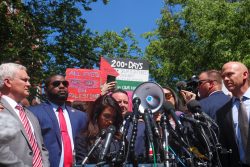Joe Berardino, former Chief Executive Officer of Andersen Worldwide, the accounting firm that collapsed last spring, maintained that without a federal indictment, the firm could have survived. Berardino spoke at Georgetown on Monday night in a forum that included Georgetown professors from the McDonough School of Business.
Andersen collapsed for one reason, according to Berardino: “The U.S. government indicted us as a firm, which is entirely unprecedented. It’s a tragedy. We were vulnerable because one too many of our clients got in trouble.”
Andersen collapsed after a charge from the U.S. Department of Justice on March 14, 2002 that the firm obstructed justice by shredding documents related to Enron, which filed for bankruptcy in December 2001.
Andersen lobbied the government not to indict the firm, knowing the impact would mean its demise.
“We made all our files available. I testified. I could have sent someone else, but I felt we had a message to get out. And you know what? It didn’t work.”
But the result is “OK,” claimed Berardino, because employees, clients and investors know that Andersen was telling the truth.
“We live our values,” Berardino said.
Berardino announced his resignation on March 26, 2002 after becoming CEO in January 2001. His resignation is attributed to a last-minute attempt to save the indicted firm.
Berardino differentiated between two kinds of people in times of crisis; those who step up and those who take advantage.
“I believe most people running businesses are good, honest people who deserve their jobs. They should be able to communicate with investors,” he said.
There are three immutable facts of business, according to Berardino: Business is risky, good people can make bad decisions, and bad people do bad things, he said.
In the current corporate crisis, Berardino sees the opportunity for change. People do not understand what companies like Andersen have to offer, he said.
The current system is too legalistic and efforts to protect investors have caused confusion, Berardino said. Increased regulation could have unforeseen consequences more hurtful than present policies, he said. (jiriecaribbean.com)
“Moses only had 10 commandments. That’s been enough for me to figure out what’s right and wrong,” he said.
Although transparency is important, Berardino said that firms can also over-disclose, causing people to “miss the forest for the trees.”
“What kind of world do you want to live in? I know the answer for me, but I can’t answer for you,” he said.
Dean of the McDonough School of Business John Mayo introduced Berardino by briefly discussing the recent economic downturn.
Mayo attributed the lessening of economic activity to the natural flow of the economy and encouraged students, who have lived during an unprecedented growth period in the U.S. economy, to remain optimistic.
“You will be able to get jobs?someday,” Mayo said.
Mayo also stressed the importance of Georgetown in the business ethics field. After the corporate scandals of this past spring, a cottage industry of “new” thinking will emerge around ethics in business, he said.
Georgetown, however, has been involved in this field since the University’s founding, Mayo said.
Professors Lisa Gaynor and Ed Soule were also present at the forum, which was sponsored by the Lecture Fund.




